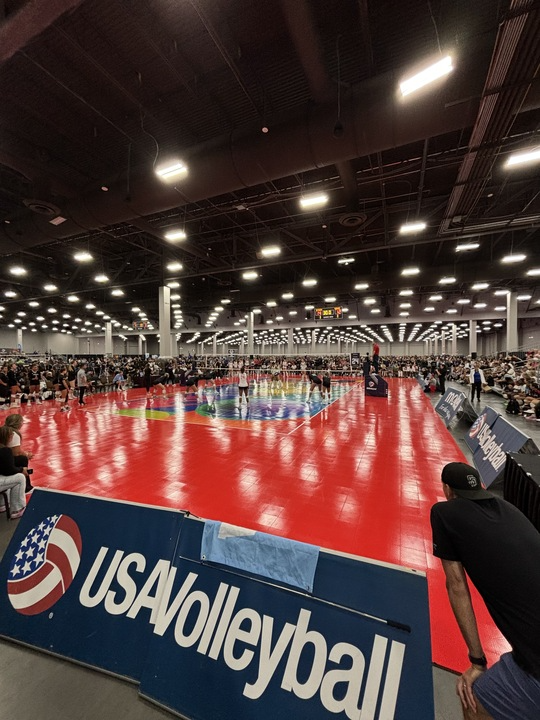Recruiting Advice Straight from College Coaches
It's the eve of Nationals for the Fourteen's and Fifteen's divisions, with players eager to follow in the footsteps of the Sixteen's and Seventeen's who wrapped up their matches yesterday. My week started at the PrepDig Showcase, where I shared personal recruiting advice: College is a business, and playing volleyball in college is a full-time job.
In college, you can learn and have fun, or you can do all that while pushing yourself on the volleyball court like never before. If you land the opportunity, you transition from being a club superstar to the youngest freshman on the team, training alongside experienced players in a demanding work environment. Mentally, physically and emotionally preparing for this transition is crucial.
But let's take a step back.
If you aspire to play college volleyball, where do you begin and how do you succeed? Just like finding a job in the real world, while some may consider recruiting services, many discover they can find direction and exposure themselves with a bit of free guidance, avoiding high expensive services. It's important to understand: in either case, it is my opinion that no one can secure you a scholarship — not a club coach, trainer, or supportive parent. As Michael Deleon says, "the only one that can give you a scholarship is the college coach themselves." It's up to you to put in the work, both on and off the court. Remember, colleges often seek athletes they can develop and mold with their training, not just those who have already peaked under their current coaches.
I believe these are the five essential steps to achieving success, not just in securing a volleyball opportunity, but in landing any job in life:
Prepare, Research, Resume, Network, Interview.
Prepare: Focus on practice, training, nutrition, mentality, and sleep—everything that prepares you for the job ahead.
Research: Determine where you want to work, your qualifications, preferred location, and college experience. Do not apply for jobs you are not qualified for. This is the beginning of your adult life; consider factors like campus culture and location, as college is often where lifelong connections are made.
Resume: Treat your profiles—Instagram, Hudl, and YouTube—as your professional branding. Ensure they are polished, professional, and regularly updated. Your resume should be updated after every event, highlighting both your on-court and off-court achievements. Showcasing your character and personality is crucial; college coaches look for coachability and a good fit for their team dynamics. Your resume is your chance to highlight your strengths—don't underestimate its importance.
Network: In life, it's not just about who you know; it's about WHO KNOWS YOU. Attend games, meet people, and actively engage with coaches. Many players attend college games, but when asked about their interactions with players or coaches, they often have little to share. Don't just be a fan; position yourself as a potential recruit. While athletes and coaches cannot initiate phone conversations until June 15 after an athlete's sophomore year, you can still introduce yourself. College coaches start building their recruiting classes well in advance of any date on a calendar.
Interview: Your tournaments, showcases, camps, and highlights effectively serve as your interviews. Display hustle, energy, your skills and love for the game in live play—movement and performance are crucial. Equally important is your conduct: how you communicate with teammates, coaches, and parents. You don't have to be the loudest vocal player, but let your talent speak loudly on the court. Your character and coachability should shine through naturally. Always be prepared to step onto the court, even when not in the starting lineup. Above all, enjoy the opportunity to showcase your skills and have passion competing.
All week, I've been at Mandalay Bay, engaging with college coaches to understand their expectations in the constantly evolving recruiting landscape. I regularly attend college practices to deepen my understanding of the sport and stay well-educated in a practical working environment of current college programs. Gathering these insights directly from college coaches, who are the providers of scholarships, is crucial. This week, I've personally spoken with coaches to gather their insights and share their advice with the 14 and 15-year-olds who are gearing up for their championship run.
To maintain anonymity, coaches from Texas, Tennessee, Oregon, Arizona, New Mexico, UC Davis, Pitt, San Diego, Duke, and several other institutions were consulted but will not be named or directly quoted below.
The following aims to deliver direct guidance from those who may offer you your first job as a college volleyball player.
"Come to the tournament, play well, play for your team, and enjoy all the hard work you've put in this season."
"Enjoy this time and don't stress out. The recruiting world has changed, and everything is pushed back later, so Nationals for 15's should be a great experience. Just enjoy it."
"Stay open. It's such a fun and exciting time. There are a lot of new changes happening, and I think the most important thing is being yourself."
"Don't worry about all the things that will take care of themselves. Enjoy the process more rather than worrying about the future. This is an amazing time to create memories and experiences with your teammates and friends that you could have for the rest of your lives."
"Trust yourself and let it rip."
"Take your time. Make sure you find the right place for you. It's important to consider everything the team and coaches have to offer. Make sure it's a good fit for you. Slow down and understand that it's your process, and no one should rush you through it."
"Play volleyball, enjoy, and have a good time with your friends. That's what we like to see. Go play and have fun."
"In general, to any young athlete, be present and compete with the group you're with. The recruiting piece is what it is, but if you play well with your teammates, things will work out."
"Speaking from experience, taking your time is worth it. You never really know how things will change in a year or two years. Take things slow. Rules have changed so much since you and I have played, and will continue to change for these players."
"At 15's, you get to have a good time. You're working on your skills and really enjoying the sport. This is the time where you should start doing your behind-the-scenes research on colleges. Figure out what you want to study, what area you want to be in. The best part is you don't have to make any decisions. You can just be Googling your own stuff and not worrying about coaches. The biggest thing is there's plenty of time and a right college for every athlete who wants to play. You have to be able to really do your homework and figure out what you want. But at 15's, you have all the time."
If you find this article valuable or have enjoyed PrepDig coverage this club season, please consider supporting us with a PrepDig subscription. Your support allows us to continue delivering quality content. Please use the discount code: Bamford30 to save on an All Access Subscription.
Also, please follow my Instagram page, PrepDigCA, for a positive player platform filled with exclusive content and behind-the-scenes action for players at all potential collegiate levels.
Let's continue to grow this positive player platform and create unforgettable memories and experiences together with your support.








